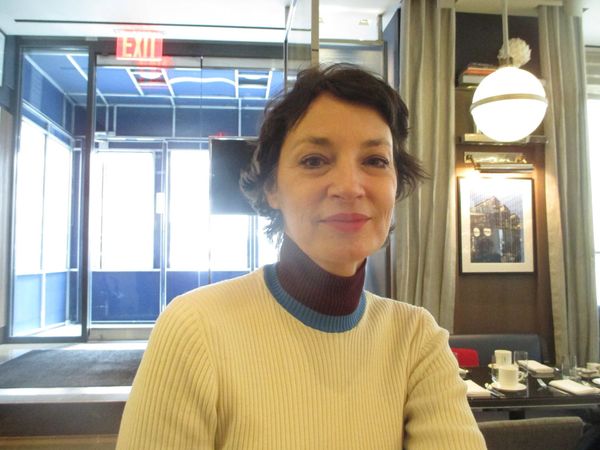 |
| Mathieu Amalric's Barbara star Jeanne Balibar is directing Mathieu, Ramzy Bédia, Emmanuelle Béart, and Bulle Ogier in Merveilles À Montfermeil Photo: Anne-Katrin Titze |
At the 56th New York Film Festival Jeanne Balibar can be seen in Pawel Pawlikowski's Cold War (Cannes Film Festival Best Director winner) starring Tomasz Kot and Joanna Kulig. Mathieu Amalric is in the Closing Night film, Julian Schnabel’s At Eternity’s Gate with Willem Dafoe as Vincent van Gogh.
Jeanne Balibar is currently in France directing Merveilles À Montfermeil. Mathieu Amalric sent the following: "Martine Marignac is producing Jeanne’s film inside my small structure named Film(s). But a lot of co-producers and friends made this film possible. Isaac Sharry (Vito films); Edouard Weil (Rectangle), Jean Cottin (les films du Cap); Benjamin Duval et Jean Pierre Gavini (Les Fils De)... And Régine Vial (Les Films du Losange) for thé distribution. It’s these common efforts and beliefs that made it so that Jeanne’s beautiful film will exist."
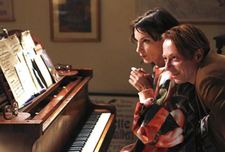 |
| Brigitte (Jeanne Balibar) with Yves (Mathieu Amalric) |
At the Regency Hotel on Park Avenue, Jeanne Balibar joined Mathieu Amalric and me for a conversation on Barbara, moral obligations, fairy tale influences, the Brothers Grimm in Göttingen, Lacan's jouissance, François Truffaut, and Jeanne and Barbara's Odessa family origins.
Anne-Katrin Titze: I am even more fascinated by Barbara now than before. She remains whole in a way. You did not cut her up into biopic chunks of a life.
Jeanne Balibar: That was our aim actually. And also we thought it was a moral question.
AKT: Moral?
JB: Yes. We were very much on the same idea. Mathieu came up with that phrase and I had been thinking about it too - that we had a moral obligation to deepen the mystery and not to try and explain it. Because nobody has the right to pretend to know and explain the mystery of any human being, whoever it is. And with the things that had happened to her.
When people have known terrible horrible things and traumas like being raped or being in a war made by the Nazis against the Jews, you don't have a right that you can pretend you know what it is. And that was our position, I think.
Mathieu Amalric: Yeah. It was funny how to play under the genre biopic because one mantra phrase was: we never know the life of a human being, of anybody. So to do the paradox of what a biopic is supposed to do, to give a meaning to a life. A life has to have meaning! She has to be a saint! She has to save us all! I don't know, somebody like that. While Jeanne was working on the music, we didn't know if this film was going to be made or not.
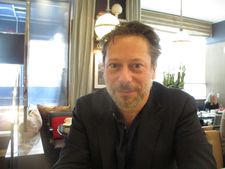 |
| Mathieu Amalric: "It's always in a film the question of how to give information, just like Petit Poucet in the forest, leaving little pebbles." Photo: Anne-Katrin Titze |
AKT: The grace that lies in the work itself came to mind. While preparing for my conversation with Bruno Dumont, I came across some memorable lines from [Charles] Péguy about craft. A lot about the work, the craft of cinema is what you are showing in Barbara. We see both of you at work. It's not hidden. I don't know if I'm making any sense.
MA: Oh, yes you are.
JB: Very much so. I remember when I was a student in England there was always this joke - they wanted all to be very intellectual and they were all talking about this word in Lacan's work - jouissance. But I think really what the whole thing is about, when you work for real, it's not fun, it's great fun. It's jouissance, this combination of desire, castration, frustration, perversion. These are all the things that are at work when you really work.
AKT: Exactly. That makes perfect sense to bring Lacan into it. Because it is destabilizing and should be. Not pleasure, but jouissance.
JB: Also it's like Truffaut said - "une joie et une souffrance" - I think this is why this film [Barbara] is also an open film, open like a Truffaut film.
AKT: Earlier this year, I introduced a screening of Le Dernier Métro around the corner at the FI:AF [French Institute Alliance Française], where this exact phrase is repeated over and over again. I would like to talk about the song Göttingen. It's so haunting and fascinating. What is the background? In your film it's like a little aside, on the parking lot.
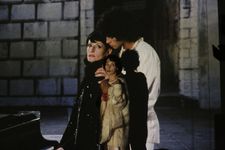 |
| Barbara and Jeanne Balibar: "We have very different silhouettes ..." |
MA: This song is from when Barbara went to Germany in 1960.
JB: She was asked to go there. There were a bunch of kids who had seen her in Paris. They were young German kids and they came to her and they said "Please come to Göttingen and sing for us!"
MA: It's a student town.
JB: At first she hesitated because she had no wish to go to Germany. Just after the war, 15 years. Sometimes I find it very weird that our children [to Mathieu] are older than the time between the Second World War and my parents' youth. It's such a short time. And then she finally agreed and she had all her songs translated into German and sang them phonetically in German.
AKT: It's impressive.
JB: For me that's very fascinating because my family comes from Odessa like hers. And often people tell me, oh you look so much like her. We have very different silhouettes, everything is different, the nose, of course. But there is a similarity here in the jaw - that may be the Jewish Odessa origin. My family was chased during the war as well. And after the war my grandfather decided that he wanted his children to learn German, to know a lot about German literature, German music and everything.
Because it was part of the belief in the greatness of humanity that Germany was not only National Socialism. So I speak German very well and I work a lot in Germany and I'm so amazed because she learned those lines phonetically. And I can't do it halfway as good as she was doing it. That's why we wanted to have the song in the film.
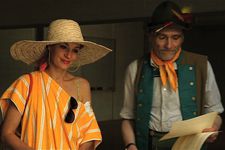 |
| Jeanne Balibar and Pierre Léon directed, wrote and starred in Par Exemple, Electre |
MA: And in German! Because in France it's really this song is the reconciliation between François Mitterrand and Helmut Kohl. It was this song that's a symbol of peace. It's always in a film the question of how to give information, just like Petit Poucet in the forest, leaving little pebbles. You know, the thing with a biopic. It was like I was stuffing a goose. As much information as possible in a shot.
AKT: A last pebble to add to the Göttingen song - it strangely enough isn't the political French-German reconciliation idea that came to mind, but the much earlier Brothers Grimm Göttingen. The Grimms taught there at the university, were part of the Göttinger Seven, who protested the king. That is also the Once Upon a Time aspect of that song.
JB: Fairy tales, talking about the costumes, is very important as well. She [Barbara] was very conscious that she was working on that level with the unconscious of the people. She's also the Fée Carabosse [wicked fairy godmother], she is also the witch. I think the way she was working was extremely intuitive, like Mathieu is as well, actually.
But she knew what she was playing with. I think she has a lot in common with Michael Jackson, actually. It's an abused kid, like he was. And then she's activating horror movies in our minds that have a lot to do with the Brothers Grimm, you know. She's the figure of the witch, the figure of the vampire.
MA: Nosferatu!
Read Mathieu Amalric and Jeanne Balibar's tribute to André S Labarthe.
Read what Mathieu Amalric had to say on Jeanne Balibar, Pierre Léon and the sounds and colorus of Barbara.





















